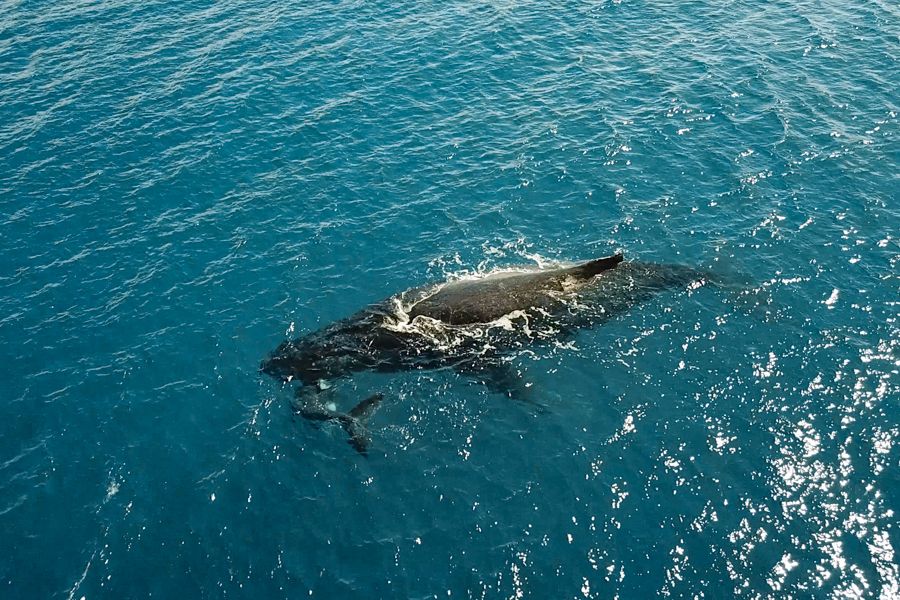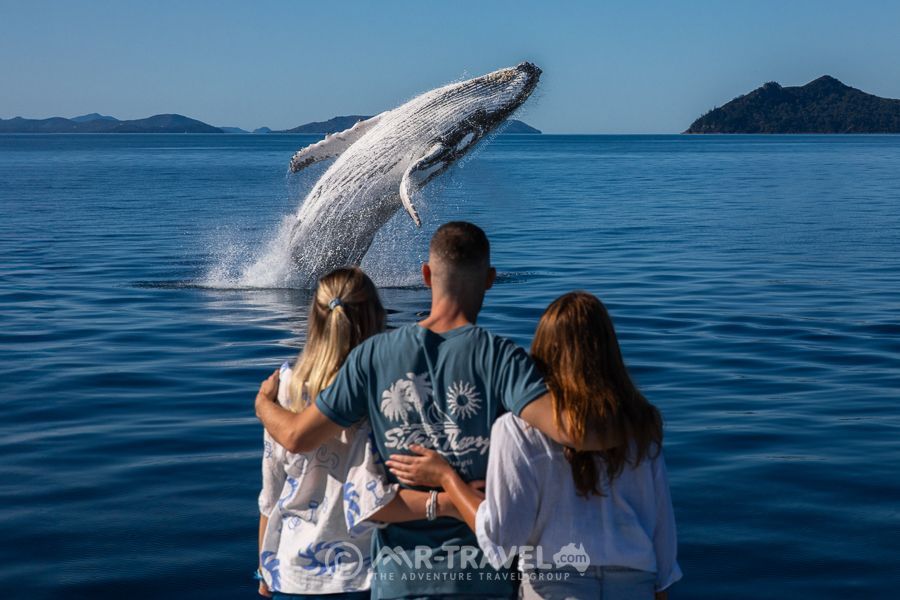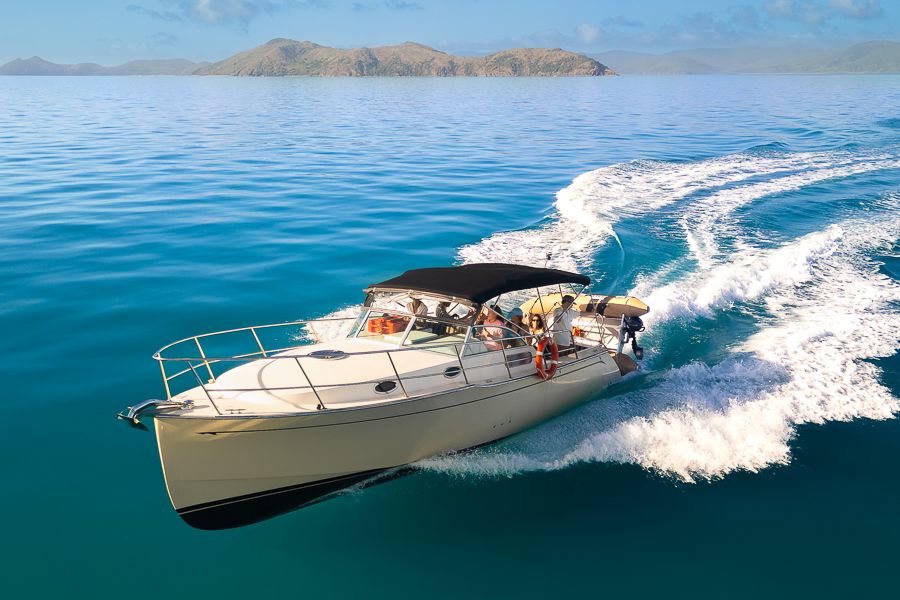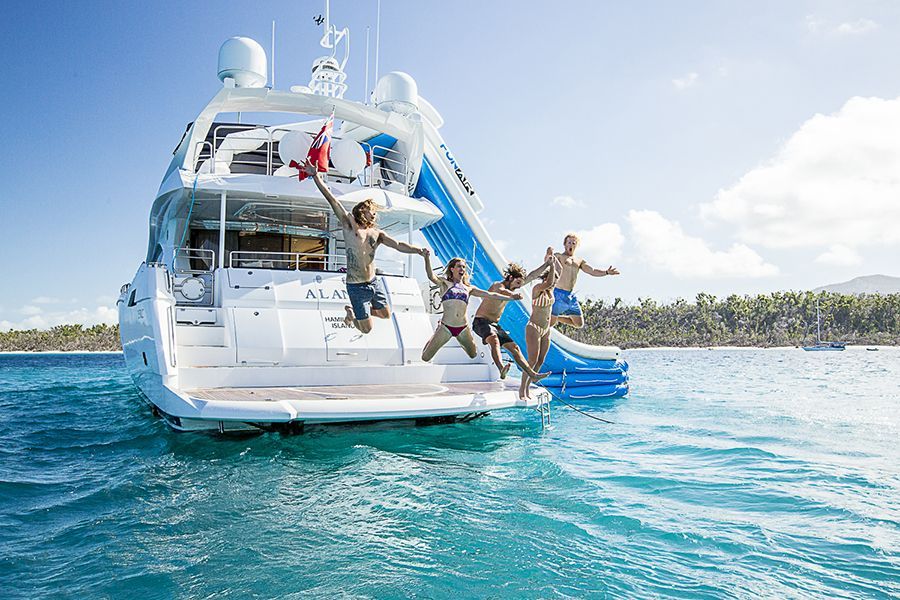Whales And Dolphins In The Great Barrier Reef
There are lots of whales and dolphins that frequent the tropical waters of the Great Barrier Reef in Australia! Whales and dolphins frequent the waters of the Whitsundays, some as full-time residents and others as visitors only. Dolphins can be seen all year around on the reefs, while whales migrate during winter only, coming to the Whitsundays to calve and nurse their young. Both are a beautiful sight, and you can spot them for yourself on any boat tour or private charter in the Whitsundays.

Types of whales and dolphins in the Great Barrier Reef
While visiting the Great Barrier Reef in Tropical North Queensland, there is a great chance you'll spot some majestic whales and dolphins out on the water. Wildlife sightings are never guaranteed out in nature, but the more quality time you spend at sea, the more likely you are to spot a whale or dolphin! Sharks, sea turtles, and tropical fish are also commonly sighted out on the Great Barrier Reef and in the Whitsunday Islands.
These private charters are perfect for spotting whales in the Whitsundays!
Humpback Whales
Humpback whales are a type of baleen whale found in the Great Barrier Reef. They are characterised by their size and behaviour and are arguably the most well-known whale species in the reef. They are grey or black, with white on their underbelly with large wing-like flippers and a small dorsal fin far down their back.
Humpbacks migrate to the Great Barrier Reef Marine Park every winter to calve and nurse their young while gaining strength and conserving as much energy as possible before returning to Antarctica to feed in the summer months. Females are larger than males and can grow up to 15 meters or 40 tonnes, and give birth approximately every two years. They are famous for their breaching abilities, often putting off mesmerising shows, full of aerobatics and leaps, making them a sought-after encounter for tourists.

Dwarf Minke Whale
Dwarf minke whales are the smallest of the baleen whale family only growing up to 8 meters in length. They too travel to the Great Barrier Reef Marine Park during the winter months, but there is little known about their migratory patterns or even why they leave the south. Unfortunately, as they were only discovered in the 1980s, there is little scientific information available about dwarf minkes.
Common Bottlenose Dolphin
The bottlenose dolphin is definitely the most iconic dolphin species, and have become the poster dolphin for the entire dolphin family. They are commonly seen in captivity and in movies (think Flipper and Sea World). Named for the shape of their nose, they are grey in colour with darker fins and white underbellies, and are roughly 2 meters in length.
Bottlenose dolphins live in pods that can range from 10 - 1000 dolphins and hunt in groups, using geo-location to locate their food, and like all other mammals, breathe oxygen to survive. They must surface every few minutes, especially when in a high-speed chase. They are extremely intelligent and are a favourite to tourists (and locals) in the Whitsundays!

Spinner Dolphin
A frequent visitor of the Outer Great Barrier Reef, the spinner dolphin is so named for its tendency to leap and spin out of the water, producing a great show for anyone around lucky enough to see it! They grow to be about 2 meters long and weigh around 75kg and can travel in groups of over 200 dolphins. They are quite playful and are often seen riding on the bow waves of passing boats!
Migaloo
Migaloo is Australia's - if not the world's - most famous whale. He is a full-grown white humpback whale and has made a reputation worldwide, drawing whale lovers to Australia in the hope of catching a glimpse. At the time of his discovery in 1991 he was the only confirmed all-white whale in the world and has since migrated to Australia yearly during the summer months.
First sighted off the shores of Byron Bay, Migaloo's activity has been tracked every year when he moves north, with websites and social media accounts dedicated to his activity. He is pure white with brown eyes, not yet allowing him to qualify as albino until further genetic testing is done, but is instead considered to be hypo-pigmented. In 2011 a second all-white whale was spotted, who is thought to be Migaloo's son. Named by Australian Aboriginals, Migaloo means White Fella.
How to see whales and dolphins in the Great Barrier Reef
Your best chances for spotting whales and dolphins on the Great Barrier Reef are booking an overnight boat tour or a private charter. There are no whale watching tours in the Whitsundays yet, but in the winter months, every boat is like a whale watching tour! Whales are frolicking in the warm tropical waters with their babies, so any chance to get out on the water means you might see whales. Dolphins are more unpredictable, but you can spot them year-round. On a private charter, you can tell your captain that you're hoping to see marine life and he can prioritise that while sailing!





















